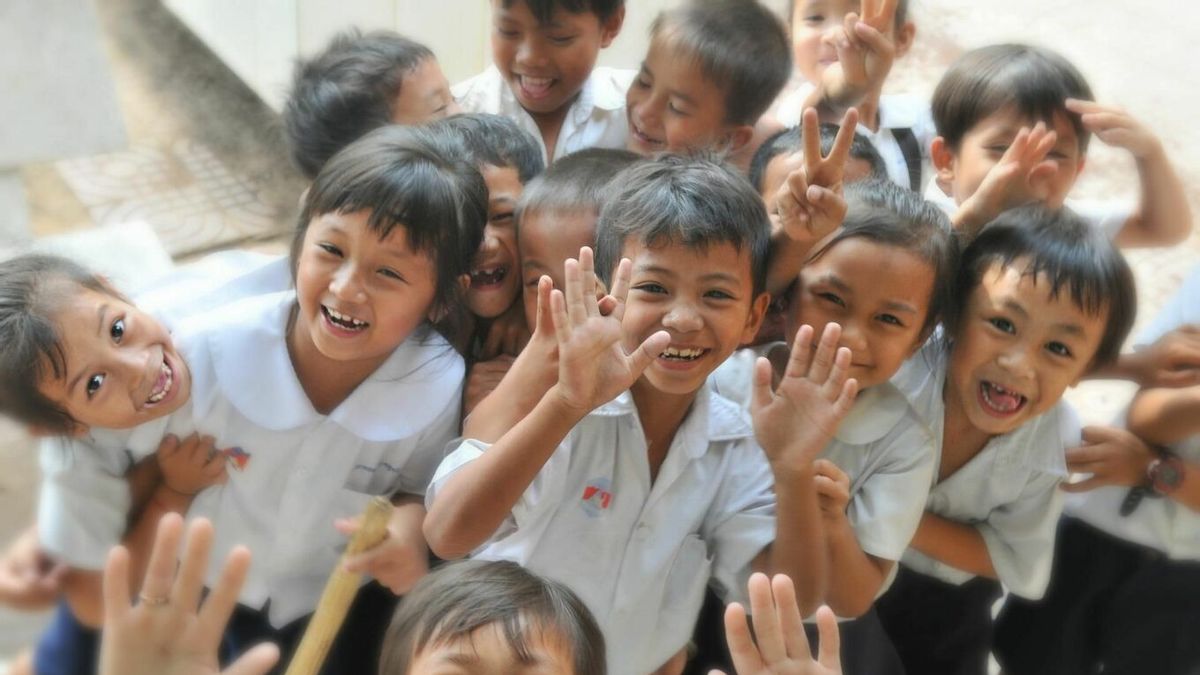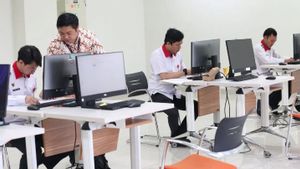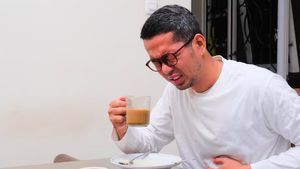JAKARTA - The tagline 'Protected Children, Advanced Indonesia' on National Children's Day 2022 which falls on July 23 is the government's commitment to provide protection and fulfill children's rights as the nation's next generation. This, said Erlinda, Expert Staff of Deputy 2 Presidential Staff, in accordance with President Jokowi's commitment to wanting Indonesian children to become the golden generation.
A symbolic action has been taken by keeping seven dreams of Indonesian children in the Time Capsule Monument in Merauke, Papua in 2018. The seven dreams are the excellence of Indonesian human resources over other nations in the world, Indonesian people who uphold pluralism, religious culture and values. ethical values, Indonesia as a center of technology and civilization education.
Then, the public and the apparatus are free from corrupt behavior, build infrastructure that is evenly distributed throughout Indonesia, Indonesia as an independent country and an influential country in the Asia Pacific, and Indonesia must be a barometer of world economic growth.
"Later in 2085 the next generation will open, whether the seven dreams can be realized or not," said Erlinda when contacted by VOI, Friday (22/6).

The President, at this time, has made a system through Presidential Regulation Number 25 of 2021 concerning Child Friendly Regency/City Policies. The rules contain strategies in an effort to fulfill children's rights which are described in five clusters: children's rights, civil rights and freedoms, family environment and alternative care, basic health and welfare, education, and special protection clusters.
“This is a reference for ministries/agencies, provincial governments, and local governments in accelerating the realization of a child-friendly Indonesia. The description is detailed in Perpres 25, what points are the targets, evaluations, targets, and others," said Erlinda.
Even so, Erlinda does not deny that there are still many obstacles and challenges to be faced. Especially related to the synergy and collaboration between all elements. Sectoral ego still dominates almost all lines, even in the lowest levels of government.
In fact, synergy and collaboration are important points to overcome or at least minimize the problems that arise.
“For example, what happened in the education cluster. The Presidential Regulation is clear, the Ministry of Education and Culture also has regulations, but there are still cases of violence against children, or bullying that occurs in the school environment. If there is synergy and commitment, these cases can be handled properly," said Erlinda.

“Especially now, we are in a new civilization. The internet, especially social media, can have a bad effect on children. Children prefer to imitate what they see. Then, television shows. When we are not equipped with the ability to filter information, this can be very dangerous," he explained.
If there is omission, abuses that are often shown will become commonplace. Inevitably, all elements must be able to function optimally, including teachers and parents.
"For example, we encourage Kominfo so that social media application vendors can filter or protect posts that lead to hate speech, insults, bullying practices, and other negative things. There are already several countries that have this commitment. Then, the school and parents are aware of the current conditions," said Erlinda again.
Synergy DefectCurrently, cases of violence against children in Indonesia are still in the spotlight. Based on data from the Indonesian Child Protection Commission (KPAI) there are 2,982 reports. The biggest is physical and psychological violence with 1,138 reports. Then, victims of sexual crimes were 859 reports, victims of online pornography were 345 reports, victims of neglect were 175 reports, victims of exploitation were 147 reports, and dealing with the law were 126 reports.
The data is evidence of the absence of synergy and collaboration between parties, both school institutions, the community, and families. The causative factors are varied.
"Starting from the negative influence of technology and information, the permissiveness of the socio-cultural environment, the weak quality of care, family poverty, high unemployment rates, to housing or living conditions that are not child-friendly," said KPAI Commissioner Retno Listyarti when contacted by VOI, Friday ( 22/7).
Usually, it happens because of neglect. Starting from verbal by berating or cursing. Then, it increases and then is beaten, increases again and then is beaten and taken for pocket money, and so on.
“So, actually because of silence, then there was an increase. Silence, maybe the victim is afraid to talk, or has reported it but the teacher never finished it, has reported to the parents but the parents also did not act to solve it, eventually it escalated, “he explained.

Look at the case of a 13-year-old Madrasah Tsanawiyah student in Kotamobagu, North Sulawesi who died as a result of being bullied by his schoolmates.
The case of abuse occurred when the victim was about to pray at the prayer room. Suddenly he was smothered and slammed to the floor. His face was covered with a prayer mat and his body was kicked. Arriving at home, the victim told his mother while complaining of stomach pain. The parents then took the victim to the hospital. Despite receiving medical treatment, the victim's life could not be saved and was declared dead on Sunday, June 12, 2022.
Then the case in one village in Singaparna District, Tasikmalaya, West Java. An 11-year-old boy was depressed and died due to bullying by his friends.
In addition to being beaten, the victim was forced to have sex with a cat, while being mocked and recorded by the perpetrators via cellphone. When the video footage spread, the victim felt more embarrassed and depressed, did not want to eat until she had to be taken to the hospital and died during treatment on Sunday (18/7).
“When the increase occurs, the child experiences anxiety, is afraid to come to school, doesn't sleep well, which in the end he can become physically ill. So starting from the psyche first, people who are worried about having trouble sleeping, their immune system goes down, eventually getting sick often. So if you get sick often, it can get worse if you leave it alone," continued Retno.
“Regarding that, parents must be able to teach their children to talk about everything that they experience at school. If the child doesn't dare to speak, the parents have to help handle it, resolve it with the school or in what way, depending on the case," he said.
In addition, continued Retno, parents must also be able to create a good parenting system in the family.
“Usually children are bullies, those children also get abused from the parenting system they receive. She doesn't dare to fight people at home, that's why she then does it to other people to children who are weaker than her, so it means that family care must be changed," said Retno again.
Skip the RulesAccording to Retno, Permendikbud 82 of 2015 has outlined efforts to prevent and overcome violence in education units. In this regulation, schools must create an anti-violence task force whose members are not only from within the school, but also involve the surrounding community. Such as RT, RW, babinsa, and kelurahan.
“Unfortunately, it is rare for schools to have a task force. Almost nothing," he said.
Then, continued Retno, Permendikbud ordered educational institutions to create a non-single complaint system. “This means that if the perpetrator is the school leader, then he complains to the teacher, the teacher is indeed brave and the school leader. So it must be reported to a higher level.”
The Ministry of Education and Culture has also suggested to the education offices to open a complaint channel.
“Just include the complaint numbers. You can complain to KPAI or to others," said Retno.
If it is proven that a violation has occurred, there must be sanctions.

"Who is the culprit, if there are children with children there is a way to overcome them. If there are teachers with children, there are already regulated ways of handling them. If it is an unscrupulous teacher and it is proven in court, the Ministry of Education and Culture will revoke the educational certificate. He can't be a teacher anymore," said Retno.
“Meanwhile, if it happens because the school system as an educational institution, for example, covers up, reports but for the sake of the school's image it is covered up, not resolved, the system is wrong, the school will be punished. For example, by revoking the boss's funds, and others. That's what the Ministry of Education and Culture has done, there is a prevention system and a handling system," said Retno
Retno acknowledged that growing a culture of child protection is certainly a challenge, but for KPAI this is the biggest energy to turn challenges into opportunities in producing new breakthroughs as an effort to advance child protection in Indonesia.
Erlinda also hopes, "The tagline 'Children are Protected, Indonesia Maju' is not just a jargon, but becomes an encouragement for us together, collaborate together, together synergize to create an Indonesia worthy of children."
Happy National Children's Day!
The English, Chinese, Japanese, Arabic, and French versions are automatically generated by the AI. So there may still be inaccuracies in translating, please always see Indonesian as our main language. (system supported by DigitalSiber.id)









